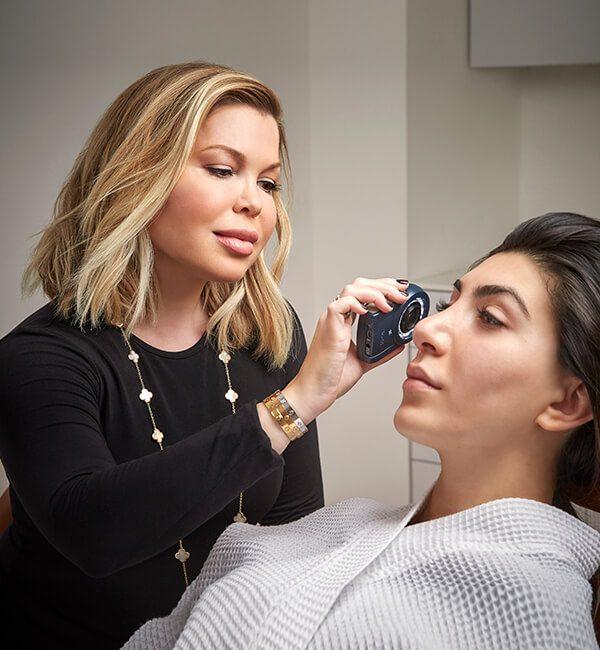- Dermatology
- Plastic Surgery
- Ariel N. Rad, M.D., PH.D.
- Face Cosmetic Surgery
- Breast Cosmetic Surgery
- Body Contouring
- Breast Cancer Reconstruction
- Destination & Travel Package
- Gallery
- Testimonials
- Boutique
- PRESS + BLOG



Inflammatory skin conditions generally present with signs such as redness, itching, or bumpy areas.
Inflammation damages collagen, and so early diagnosis and treatment of these conditions is key to preserving skin health in the long term.
RECOMMENDED TREATMENTS
Whether for acne, rosacea, eczema, or dermatitis, Dr. Sherber customizes a regimen for each patient tailored to specific skin type and individual symptoms.
A combination of over-the-counter and prescription medications may produce the most rapid and durable results, and Dr. Sherber adjusts each regimen carefully to optimize it for each patient over time.

Acne can occur from infancy through adulthood, and is certainly not only a teenage concern.
The most up to date understanding of acne is that it is primarily an inflammatory condition. Hormonal changes can play a prominent role in the type of oil produced by the skin, dead skin cells and bacteria can accumulate in the oil inside the pores, and the body can then direct inflammation towards the oil glands.
Inflammation can damage the skin’s collagen, resulting in scarring, or can cause persistent pigmentation or redness in areas of prior breakouts.
RECOMMENDED TREATMENTS
Dr. Sherber customizes ever patient’s acne treatment regimen.
Daily Skincare is very important in managing acne. Topical anti-inflammatories such as polyphenol antioxidants are effective in calming inflammation, while exfoliants containing salicylic acid are excellent in unclogging pores.
Prescription approaches may range from short-contact masks to overnight treatments, and offer more potent formulations than over-the-counter skincare.
For certain patients, hormonal testing may be indicated so that root causes of acne can be addressed.
For those who are experiencing acne scarring or treatment-resistant breakouts, Dr. Sherber is experienced in structuring low-dose weight-based Accutane regimens to change the behavior of the oil glands permanently and cure the acne definitively.
In-office Vivité Peels can accelerate results from topical treatments, and laser treatments such as Perméa or Laser Genesis can fade marks left behind from prior acne.
Rosacea is a genetically-influenced condition characterized by a range of signs and symptoms from facial flushing to acne-like bumps to dilated blood vessels on the face.
Dr. Sherber is experienced at distinguishing rosacea from the conditions that can mimic it.
Erythematotelangiectatic rosacea can be missed if someone thinks that they merely have sensitive skin that stings and flushes easily. Early diagnosis is key to preventing longterm skin changes.
Rosacea that involves either episodic or constant inflammatory bumps on the face can be mistaken for acne, and made worse by acne treatments.
Periorifical dermatitis, which involves inflammatory bumps around the mouth, nose, or eyes, is a sub-type of rosacea which is often aggravated by misdiagnosis and misuse of topical steroids.
Sometimes, skin can be aggravated by external irritants such as skincare or makeup products, which can mimic rosacea but requires different treatment.
RECOMMENDED TREATMENTS
Laser treatments such as Laser Genesis and Nd:YAG can fade Redness and Visible Veins.
Laser-assisted delivery of anti-inflammatory active ingredients using the Perméa laser can produce significant improvements in skin’s appearance and reactivity.
Eczema can present with anything from chronically dry skin that’s difficult to keep moisturized, to itchy red rough skin that’s actively inflamed.
It runs in families, and is associated with abnormalities a filaggrin protein that is integral to the skin’s barrier. It can be inherited with a tendency for food allergies and/or asthma.
RECOMMENDED TREATMENTS
It is important to use Skincare products that do not further inflame eczematous skin.
Dry skin is itchy skin, and eczema is known in classic dermatology textbooks as “the itch that rashes,” so keeping the skin well moisturized is key to symptom management.
Vegetable oils moisturize better than mineral oil does, and topical ceramides help to reinforce the skin’s barrier that holds water in.
For infants and small children, Dr. Sherber recommends skincare products without synthetic fragrance and with a focus on *natural ingredients*, and minimal use of prescription medications.
Bleach baths, as outlined by the American Academy of Dermatology, are sometimes beneficial.
For adults, Dr. Sherber may also explore whether skin allergies or underlying conditions are playing a role.
Eczema may flare up during pregnancy, during which time treatment regimens must be specially designed to avoid certain medications and ingredients.
Some skin types are highly reactive and prone to intense allergic reactions. Other skin types may not be prone to frequent allergic reactions but may develop subtle signs of acute or chronic allergy. Allergic reactions in the skin may be the result of topical or systemic exposures.
Skin changes relating to allergy may range from itchy red rashes to acne-like bumps to blisters.
One particular type of allergic dermatitis, called phytophotodermatiits, occurs when the skin is exposed to lime juice or other particular juices, and then sunlight. Called “lime disease,” the phytotoxic reaction can cause redness and even blisters, and can leave stubborn pigmentation behind.
RECOMMENDED TREATMENTS
Dr. Sherber spends time tracing back through exposure histories and evaluating the skin for subtle clues, and may recommend a biopsy to clarify the cause of skin symptoms relating to allergy.
Dr. Sherber may prescribe a “skin diet” to eliminate potential allergens in your skincare products, makeup, or haircare.
For allergies relating to medications, supplements, or dietary sources, Dr. Sherber may involve an allergist to assist in getting to the root cause of the problem.
Prescription medications may be needed in the short term to calm an allergic reaction.



Dr. Sherber graduated magna cum laude from Harvard University, where she designed and implemented a novel degree program in health policy focused on assessing and improving quality of care. She next attended the Johns Hopkins University School of Medicine where she earned her M.D. degree. Following a post-doctoral fellowship in clinical research at Columbia University, she returned to Johns Hopkins for dermatology residency training and conducted research in scar healing and in disorders of abnormal collagen. She is now a Clinical Assistant Professor at George Washington University in the Department of Dermatology.
We look forward to welcoming you for your private consultation
Enjoy a unique experience centered on your privacy and on unhurried attention to your concerns
Or Send a confidential inquiry and our staff will be happy to reach out to you
Sherber+Rad1101 15th St. NW, Suite 100, Washington, D.C. 20005